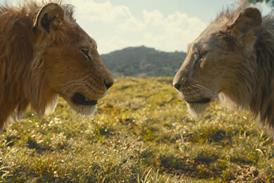Dir: Sue Brooks. Australia. 2003. 107mins
A seemingly conventional mixture of life-changing road movie and cross-cultural romance becomes something much more interesting and intense thanks to an unexpected plot twist in the final third of Japanese Story. It may come too late for some viewers who will have already lost patience with a sluggish storyline that seems to have little fresh on offer. It is a shame because events thereafter significantly develop the film's themes of happiness being fleeting and life being too short to squander on petty disputes and wasted opportunities. The film-makers have requested that the media refrain from revealing the twist, leaving the film a tougher prospect to sell. Stunning location photography of the Pilbara desert and engaging performances from Toni Collette and Gotaro Tsunashima should give the film a fighting chance internationally, but commercial prospects are tricky at best for a venture that might only truly work its spell on incurable romantics. Palace Films releases it in Australia on Oct 3 after its world premiere in Un Certain Regard at Cannes. Samuel Goldwyn Films bought US rights on the Croisette.
The film begins by setting us on what appears to be a predictable path. Hard-working geologist, Sandy (Collette) is less than pleased to be lumbered with babysitting a well-connected Japanese businessman on a field trip to the Australian desert. However, it is a perfect opportunity to promote her software company, so she reluctantly agrees to act as his driver and fellow traveler. Hiromitsu (Tsunashima) proves to be a demanding companion, expecting her to drive him long distances to steel works and ore fields. He finds her rude and aggressive. She sees him as surly, sexist and deliberately non-communicative. Each provides a mirror of the flaws that the other person fails to recognise in themselves.
At this stage it seems fair to assume that the friction between the couple will eventually ease into some kind of love affair as oriental reserve clashes with antipodean belligerence. That is exactly what happens after the couple are stranded in the desert one night, as shared adversity leads to a mutual understanding and romance. So far, so conventional. Pretty pictures; soulful silences; happy endings.
Then the plot twist arrives, and the film dabbles in black comedy, real emotional distress and looks at the way random events can turn the world upside down in a minute. It is almost as if the film starts off in Jim Jarmusch territory and somehow strays into the kind of terrain Kieslowski might have explored.
Director Sue Brooks is not in the class of either of those luminaries. The early scenes of Alison Tilson's script are not quite quirky or sharp enough and some of the ideas are bluntly stated. Sandy is all too quick to disappoint friends and family, caught up in her own priorities and certain there will be another day. 'Even when you are here, you are not even here,' claims one friend.
Hiromitsu's sense of freedom from the obligations of his life in Japan is also spelt out in capital letters. The ending tends to overindulge the maudlin aspects of the story as Sandy finds herself profoundly changed by her brief encounter with Hiromitsu. Thus the film is broken-backed and fails to make all the right connections, although there is an appealing symmetry in scenes with Sandy's death-obsessed mother (Curran) and an admirable sense of ambition running throughout the whole production.
Prod co: Gecko Films
Int'l sales: Fortissimo Film Sales
Aust dist: Palace Films
Prod: Sue Maslin
Scr: Alison Tilson
Cinematography: Ian Baker
Prod des: Paddy Reardon
Ed: Jill Bilcock
Music: Elizabeth Drake
Main cast: Toni Collette, Gotaro Tsunashima, Lynette Curran, Yumiko Tanaka, Matthew Dyktynski


















No comments yet